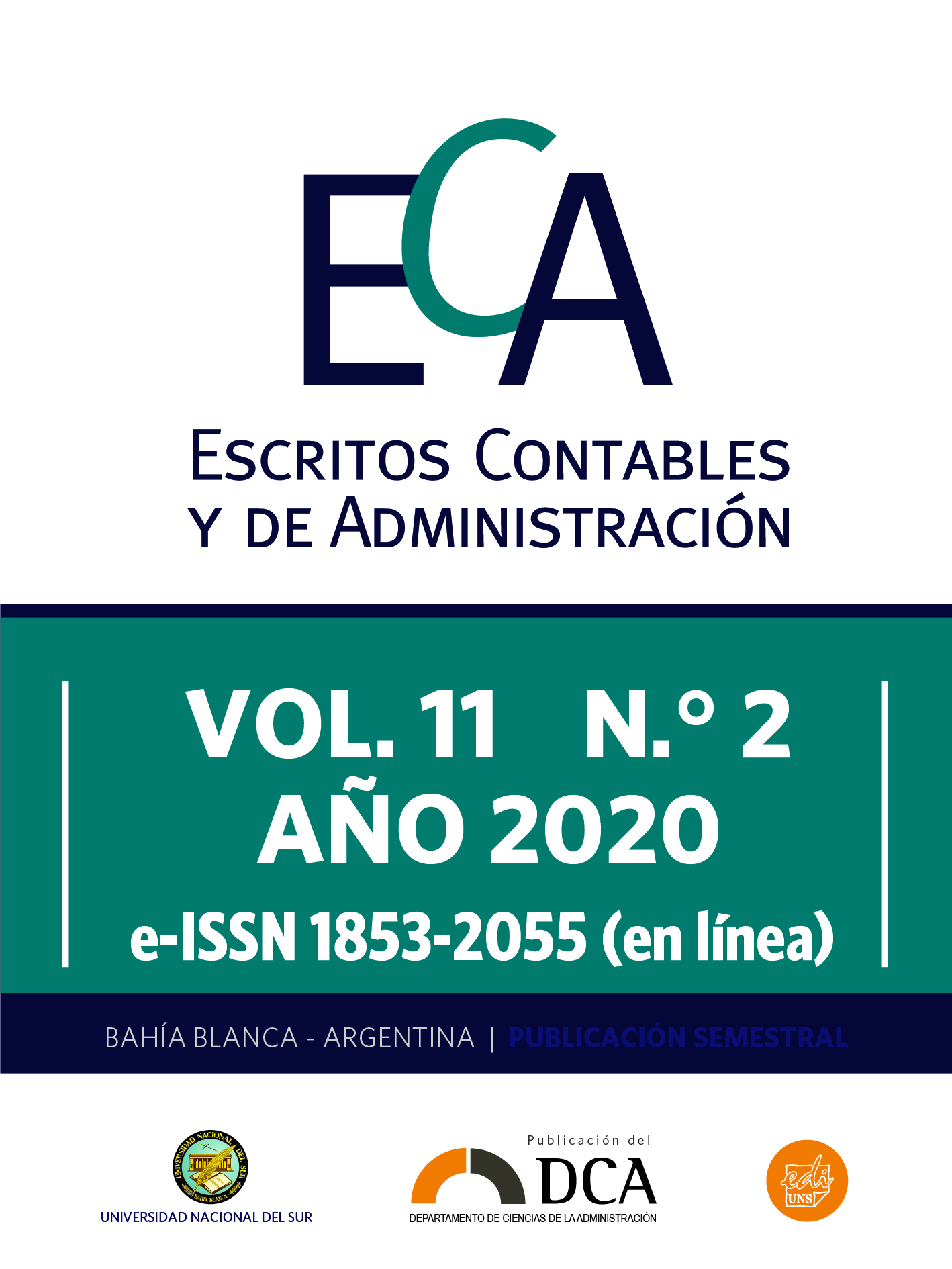Financial information of Argentine companies faced with covid-19: an analysis of disclosures and regulatory compliance
DOI:
https://doi.org/10.52292/j.eca.2020.2033Keywords:
accounting information, financial statements, events after the reporting period, coronavirus, ArgentinaAbstract
Many strategic, tactical and operational decisions must be based on quality information. Relevance and faithful representation are fundamental qualitative characteristics for financial information to be useful. This paper aims to make a theoretical approach and an empirical analysis of whether Argentine companies disclose issues related to COVID-19, complying with the requirements of accounting and regulatory standards. For this purpose, an applied and exploratory research is carried out, and a methodology is developed to collect information related to the coronavirus in the financial statements, the compliance with control organisms and the impact on the stock market. Significant deficiencies are found in the application of the existing regulation, which negatively impacts on the quality and usefulness of the information. Given this scenario, it is essential to review the theoretical assumptions that should guide the tasks of preparing and reviewing accounting information.
Downloads
References
Abarbanell, J. & Bushee, B. (1997). Fundamental Analysis, Future Earnings. and Stock Prices. Journal of Accounting Research, 35(1), 1-24. https://doi.org/10.2307/2491464
Alzúa, M. L. & Gosis P. (2020). Impacto socio-económico del Covid-19 y opciones de política en Argentina. Serie de Documentos de Política Pública N6, Nueva York: PNUD, RBLAC. https://www.latinamerica.undp.org
American Accounting Association. Committee to Prepare a Statement of Basic Accounting Theory. (1966). A statement of basic accounting theory. American Accounting Association.
Comisión Nacional de Valores (2013). Normas CNV – Texto Ordenado 2013. https://www.cnv.gov.ar/descargas/MarcoRegulatorio/blob/499EC64A-E522-49D2-8F49-D9624B6DC49B
Fowler Newton, E. (2016). Contabilidad superior (7.a edición). Buenos Aires: La Ley.
Giner Inchausti, B., Reverte Maya, C. & Arce Gisbert, M. (2002). El papel del análisis fundamental en la investigación del mercado de capitales: análisis crítico de su evolución. Spanish Journal of Finance and Accounting / Revista Española de Financiación y Contabilidad, 31(114), 1111-1150. https://doi.org/10.1080/02102412.2002.10779470
Hendriksen, E. S. (1977). Accounting theory. Homewood, IllinoisCiudad: McGraw-Hill/Irwin.
IASB (2020a). El Marco Conceptual para la Información Financiera. http://eifrs.ifrs.org/eifrs/bnstandards/es/2020/framework.pdf
IASB (2020b). NIC 10 – Hechos ocurridos después del periodo sobre el que se informa. http://eifrs.ifrs.org/eifrs/bnstandards/es/2020/IAS10.pdf
Jensen, M. C. & Meckling, W. H. (1979) Theory of the Firm: Managerial Behavior, Agency Costs, and Ownership Structure. En Brunner K. (ed.), Economics Social Institutions. Rochester Studies in Economics and Policy Issues, vol. 1. Springer, Dordrecht. https://doi.org/10.1007/978-94-009-9257-3_8
McKibbin, W. J. & Fernando, R. (2020). The global macroeconomic impacts of COVID-19: Seven scenarios. http://dx.doi.org/10.2139/ssrn.3547729
Naciones Unidades Argentina. (2020). Análisis inicial de las Naciones Unidas: Covid-19 en Argentina: Impacto socioeconómico y ambiental. https://www.onu.org.ar/stuff/Informe-COVID-19-Argentina.pdf
Ohlson, J. A. (1995). Earnings, book values, and dividends in equity valuation. Contemporary accounting research, 11(2), 661-687. https://doi.org/10.1111/j.1911-3846.1995.tb00461.x
Penman, S. H. (1992). Return to fundamentals. Journal of Accounting, Auditing & Finance, 7(4), 465-483. https://doi.org/10.1177/0148558X9200700403
Rappaport, A. (2006). La creación de valor para el accionista: una guía para inversores y directivos. Barcelona: Deusto.
Remolina, N. (2020). Respuestas de Supervisores y Reguladores Financieros al COVID-19 (Financial Regulators’ Responses to COVID/19). http://dx.doi.org/10.2139/ssrn.3554557
Sacer, I. M., Malis, S. S. & Pavic, I. (2016). The Impact of Accounting Estimates on Financial Position and Business Performance–Case of Non-Current Intangible and Tangible Assets. Procedia Economics and Finance, 39, 399-411. https://doi.org/10.1016/S2212-5671(16)30341-0
Shroff, P. K. (1999). The variability of earnings and non‐earnings information and earnings prediction. Journal of business finance & accounting, 26(7‐8), 863-882.https://doi.org/10.1111/1468-5957.00278
Tua Pereda, J. (1991). La Investigación empírica en contabilidad. Los enfoques en presencia. Revista Española de Financiación y Contabilidad, 7-82. https://www.jstor.org/stable/42780079
Published
How to Cite
Issue
Section
License
Aviso de derechos de autor
Aquellos autores/as que tengan publicaciones con esta revista, aceptan los términos siguientes:
- Los autores/as conservarán sus derechos de autor y garantizarán a la revista el derecho de primera publicación de su obra, el cual estará simultáneamente sujeto a la licencia Atribución-No Comercial 4.0 Internacional CC BY-NC 4.0.
- Los autores/as podrán adoptar otros acuerdos de licencia no exclusiva de distribución de la versión de la obra publicada (p. ej.: depositarla en un archivo telemático institucional o publicarla en un volumen monográfico) siempre que se indique la publicación inicial en esta revista.
- Se permite y recomienda a los autores/as difundir su obra a través de Internet (por ej.: en páginas web institucionales o personales) una vez publicado su trabajo, lo cual puede producir intercambios interesantes y aumentar las citas de la obra publicada (Véase El efecto del acceso abierto).





















